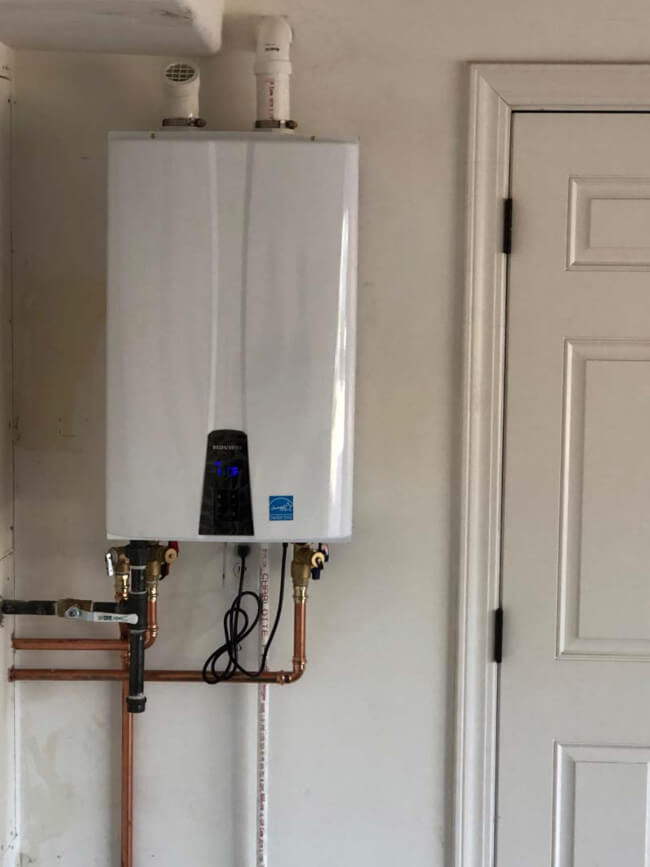
Are you tired of sky-high energy bills? The solution might be simpler than you think. Tankless water heaters are revolutionizing home energy efficiency. These compact powerhouses offer on-demand hot water while slashing utility costs. In Paso Robles, homeowners are discovering the benefits of these innovative systems. Quality 1st Plumbing And Drains has been at the forefront of this revolution, installing an efficient tankless water heater in Paso Robles. But what makes these systems so special?
Tankless water heaters operate differently from traditional tanks. They heat water only when needed. This on-demand approach eliminates standby heat loss. Traditional tanks constantly heat water, wasting energy. Tankless systems avoid this pitfall. The U.S. Department of Energy reports significant efficiency gains. Homes using 41 gallons or less daily can see 24% to 34% improvement. Even high-usage households benefit, with 8% to 14% increased efficiency.
But what about the downsides? Initial costs are higher. Installation can be complex. Some homes may need electrical or gas line upgrades. Despite these hurdles, long-term savings often justify the investment. The extended lifespan of tankless units adds to their appeal.
Can you replace a 40-gallon tank with a tankless system? Absolutely. But sizing is crucial. Tankless heaters are rated by flow rate, not capacity. Consider your peak hot water demand. Running multiple showers simultaneously requires higher flow rates. A professional can help determine the right size for your needs.
Is switching worth it? It depends on your situation. Consider your current energy costs. Evaluate your hot water usage patterns. The condition of your existing heater matters too. Homes with high demand or in areas with expensive energy often benefit most.
Cost is a key factor. Prices vary widely. Small electric models start around $500. High-capacity gas units can exceed $2,000. Installation costs aren’t included in these figures. They vary based on job complexity and local labor rates. The initial investment is higher than traditional tanks. But long-term savings and extended lifespan offset this over time.
Proper installation is critical. Venting requirements depend on unit size, fuel type, and location. Gas models need careful venting for safety. Some units require larger vents, affecting installation options. Professional installation ensures optimal performance and safety.
Tankless heaters come in various types. Gas-fired and electric are the main categories. Gas models offer higher flow rates. They’re suitable for larger households. Electric units are more compact. They’re often easier to install but may have lower flow rates.
Energy efficiency is a major selling point. Electric models can be up to 99% efficient in energy conversion. Overall efficiency depends on local electricity rates and usage patterns. In some areas, gas models may be more cost-effective to operate.
Sizing is crucial. “How many gpm for tankless water heater?” is a common question. GPM (gallons per minute) needs vary by household. A typical family might require 6-8 GPM for multiple simultaneous uses. Accurate sizing ensures adequate supply without wasting energy.
Maintenance is important for tankless systems. Regular descaling removes mineral buildup. This maintains efficiency and extends system life. Tankless units generally need less frequent maintenance than traditional tanks. However, consistent care is essential for optimal performance.
Modern tankless heaters offer advanced features. Some have Wi-Fi connectivity for remote control. Others include recirculation pumps for instant hot water. These features enhance convenience and efficiency.
Rebates and incentives can offset initial costs. Many utilities offer financial incentives for energy-efficient appliances. Research available programs in your area. They can make the transition more affordable.
Environmental benefits are significant. Reduced energy consumption lowers your carbon footprint. This aligns with a growing interest in eco-friendly home improvements. It contributes to broader energy conservation efforts.
For those in Paso Robles, local experts can provide valuable guidance. They assess your home’s specific needs. They recommend appropriate models. Professional installation is crucial for optimal performance. It may be required to maintain warranty coverage.
When comparing tankless options to traditional tanks, consider long-term benefits. Tankless systems offer significant energy savings over time. They also save space. The choice often depends on home size, hot water demand, and energy costs.
Do big box stores install tankless heaters? Many do. However, specialized plumbing companies often provide more personalized service. They navigate local codes effectively. They optimize system placement. They ensure proper integration with existing plumbing.
In conclusion, tankless water heaters are a powerful tool for reducing energy bills. They require a higher initial investment. But long-term savings are substantial. Unlimited hot water and reduced environmental impact add to their appeal. Proper sizing and installation are key to maximizing benefits. As energy costs rise, these efficient systems become increasingly valuable. For Paso Robles residents, Quality 1st Plumbing And Drains offers expert installation of a tankless water heater in Paso Robles. They help homeowners navigate the transition to more efficient, cost-effective hot water solutions. It’s time to unlock the hidden power of tankless water heaters in your home.
